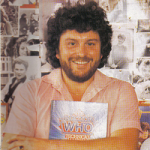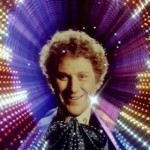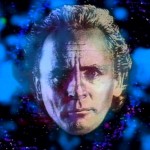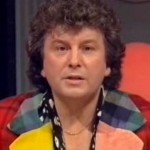 The first thing I have to say about Richard Marson’s book, The Life and Scandalous Times of John Nathan-Turner, is just how much I detest the title. I know authors and publishers are in the business of selling books, but for me, choosing this title amounts to little more than a cynical marketing ploy to generate wider interest in a book that has little appeal outside of the anorak-wearing Doctor Who community.
The first thing I have to say about Richard Marson’s book, The Life and Scandalous Times of John Nathan-Turner, is just how much I detest the title. I know authors and publishers are in the business of selling books, but for me, choosing this title amounts to little more than a cynical marketing ploy to generate wider interest in a book that has little appeal outside of the anorak-wearing Doctor Who community.
The opening few chapters of the book look at John’s early life and make for fairly interesting, if unremarkable, reading. We learn something of his family life, time at school, friendships, and enthusiasm for all things theatrical. We learn that as a child he was a bit of a show-off sometimes and liked nothing more than being the centre of attention. As a teen he liked music, being particularly fond of Dusty Springfield, and that he once purchased a pac-a-mac at the seaside because it was raining. Hold the presses stuff, to be sure.
 From there the book progresses on to John’s short-lived career as an actor before he joined the BBC. Friends and colleagues remember this as a happy time for him; he was considered extremely competent, hard-working and was well-liked by everyone for his sense of humour and warm personality. In fairness to Marson he covers John’s earlier years at the BBC quite even-handedly, although there is always a gossipy over-the-garden-wall quality to much of what he writes, interspersed with quotes from friends and colleagues, an approach that I feel is over-used and doesn’t quite work for me.
From there the book progresses on to John’s short-lived career as an actor before he joined the BBC. Friends and colleagues remember this as a happy time for him; he was considered extremely competent, hard-working and was well-liked by everyone for his sense of humour and warm personality. In fairness to Marson he covers John’s earlier years at the BBC quite even-handedly, although there is always a gossipy over-the-garden-wall quality to much of what he writes, interspersed with quotes from friends and colleagues, an approach that I feel is over-used and doesn’t quite work for me.
 One of the reasons it doesn’t work is that the battle lines are clearly drawn early on, with one group pro John and the other still very much against. In fact at certain points in the book, especially when there is conflict, it starts to feel more like a list of quotes rather than the story of someone’s life. One person makes a claim, another refutes it, and makes a counter-claim. Someone is accused of having said or done something and denies it, then is accused of being a liar or having a particular axe to grind, and so it goes on. At a guess I’d say that if all the quotes were removed from this book it would be a slender volume indeed.
One of the reasons it doesn’t work is that the battle lines are clearly drawn early on, with one group pro John and the other still very much against. In fact at certain points in the book, especially when there is conflict, it starts to feel more like a list of quotes rather than the story of someone’s life. One person makes a claim, another refutes it, and makes a counter-claim. Someone is accused of having said or done something and denies it, then is accused of being a liar or having a particular axe to grind, and so it goes on. At a guess I’d say that if all the quotes were removed from this book it would be a slender volume indeed.
The biggest failure of this book is that no-one who reads it is likely to change their mind very much about John Nathan-Turner, one way or the other. What readers may change their minds about are some of the people who chose to contribute to it.
Gary Downie aside, the people who come off worst from this book are the Doctor Who fans themselves – especially some of the so-called ‘superfans’ of the day.
 One thing is clear from the book, while John was often a willing participant, Gary was the one who actively sought out men for their sexual gratification, trawling Doctor Who conventions for what the two of them described as “doable barkers”. Although no-one has ever come forward to allege any improper behaviour by the pair, Sophie Aldred who played Ace in the series, does say in the book: “There was quite a lot of stuff that I wouldn’t have been comfortable with and I believe some of the fans may have suffered… young men”. However Aldred offers no evidence to indicate that any sexual liaisons John and Gary had with fans of the show were anything other than consensual.
One thing is clear from the book, while John was often a willing participant, Gary was the one who actively sought out men for their sexual gratification, trawling Doctor Who conventions for what the two of them described as “doable barkers”. Although no-one has ever come forward to allege any improper behaviour by the pair, Sophie Aldred who played Ace in the series, does say in the book: “There was quite a lot of stuff that I wouldn’t have been comfortable with and I believe some of the fans may have suffered… young men”. However Aldred offers no evidence to indicate that any sexual liaisons John and Gary had with fans of the show were anything other than consensual.
 This is not the only example of material being included in the book which isn’t substantiated. Time and again in this book we are presented with someone’s version of events remembered in a way that tends to present them in a particular light, with blame for whatever went wrong mostly shunted off onto somebody else. This is one theme of the book which becomes tiresome very quickly, as does the gossipy bitchy tone of some of the interviewees, some of whom I had never heard of before, and if this is anything to go by hope never to hear of again.
This is not the only example of material being included in the book which isn’t substantiated. Time and again in this book we are presented with someone’s version of events remembered in a way that tends to present them in a particular light, with blame for whatever went wrong mostly shunted off onto somebody else. This is one theme of the book which becomes tiresome very quickly, as does the gossipy bitchy tone of some of the interviewees, some of whom I had never heard of before, and if this is anything to go by hope never to hear of again.
For me one of the few sections of the book deserving some praise are the final chapters. These deal with John’s faltering career, failing health and eventual death. They are written with a small degree of sensitivity, absent from most of the book – an absence which may prompt some cynical readers to question it’s authenticity at this late stage.
 Would I recommend this book to another Doctor Who fan? Reluctantly, yes I would. If you can endure reading about the exploits of some of the dreadful people mentioned in it – occasionally including John himself, who certainly had his moments – the book is an interesting document about how television used to be made at the BBC, in particular Doctor Who, during the era of producer John Nathan-Turner.
Would I recommend this book to another Doctor Who fan? Reluctantly, yes I would. If you can endure reading about the exploits of some of the dreadful people mentioned in it – occasionally including John himself, who certainly had his moments – the book is an interesting document about how television used to be made at the BBC, in particular Doctor Who, during the era of producer John Nathan-Turner.
Written by Mike Nuttall
